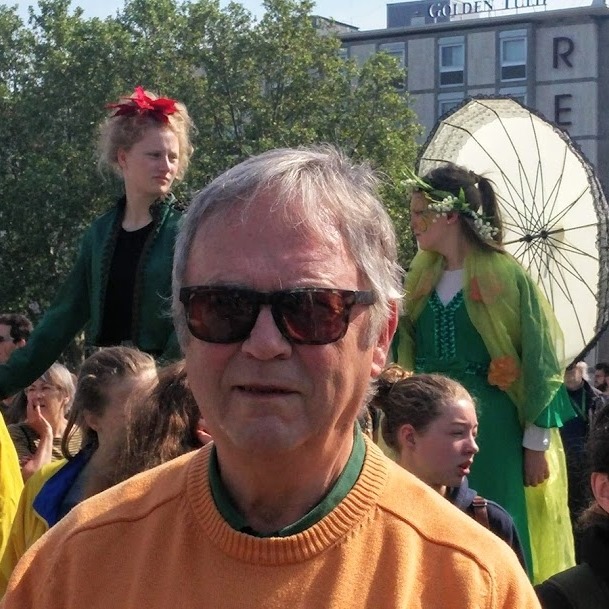In most of its operations, the CIA is a conspiracy, using covert actions and secret plans, many of which are of the most unsavory kind. What are covert operations if not conspiracies? At the same time, the CIA is an institution, a structural part of the national security state. In sum, the agency is an institutionalized conspiracy (pp. 185-186).
When I read that 1993 essay now, I see that I made almost all the points that I would elaborate on, and keep coming back to, over the coming years:
Thus Chomsky, uncharacteristically, is telling us the same thing the government, the mass media, and Establishment historians have been telling us for almost thirty years--that the assassination had no political significance. The withdrawal plan was never a secret, but the overwhelming majority of historians have simply ignored those forty pages in the Gravel PP [Pentagon Papers] (also carefully circumscribed in the New York Times edition of the PP), treating the Kennedy-Johnson Vietnam policy as a seamless continuum, exactly as Chomsky does.
The Establishment consensus that there was no Vietnam policy reversal after the assassination is no longer "overwhelming," as it was in 1993 (see Ch. 2, "The Second Biggest Lie" in Looking for the Enemy), but the parenthetical point about the New York Times being part of and even responsible for this consensus by "circumscribing," i.e. disguising, the policy reversal - in contrast to the Gravel edition - is still something that no one else has pointed out, as far as I know.
This is important because it implicates the NYT in - dare I say it - a conspiracy to keep the policy reversal unknown to the general public.
I don't think "conspiracy" is too strong a word here. The NYT did not "publish the Pentagon Papers," as is widely assumed. They published only selected excerpts, first in the newspaper from June 13 to July 14, 1971, and then in the Bantam paperback that came out July 8 and that sold 500,000 copies the first week and required a second printing of more than a million copies.
If my analysis is correct - and I went into much more detail in the long essay published in January 2019 ("Vietnam: How They Played(ed) Us") - then the policy reversal was misrepresented (by omission, which is what I meant above by "carefully circumscribed") in the NYT edition of the Papers, which very likely set the tone for scholars as well as for the general public. The crucial chapter in Volume 2 of the Gravel edition, "Phased Withdrawal of U.S. Forces, 1962-1964," did not become available to the general public until Beacon Press published it in October 1971, three months after the NYT had flooded the market with its abridged edition.
In sum, you get two very different pictures of the "transition" from the Kennedy to the Johnson administrations with regard to Vietnam policy when you compare carefully the NYT edition and the Gravel edition of the Pentagon Papers. In the NYT version, there is a smooth transition, just as Establishment historians have assumed and asserted until fairly recently. In the Gravel edition, there is an entire chapter devoted to the withdrawal policy that makes it clear that Johnson reversed that policy shortly after the assassination. Exactly when is not important, despite the voluminous and hopelessly confusing "debate" between Chomsky and Newman et al. Nor does Chomsky's attempt to interpret "withdrawal" as "withdrawal without victory" succeed in negating the fact that the policy was reversed, as I spent literally years trying to convince him, to no avail.
Thus, since no one else has done so, I will allow myself to chalk up two more accomplishments: 1) the debunking of Chomsky's argument that "there was no withdrawal policy" (and therefore there could be no reversal), and 2) the debunking of the false debate between Chomsky and Newman regarding the same subject (about what JFK "intended to do" or "would have done"; (see here and here).
The overall thesis of "Vietnam: How They Played(ed) Us" is admittedly speculative, so I hesitate to call it an "accomplishment." But it makes sense to me. Let me see if I can put it in a few sentences.
Big Brother (or the "Deep State," if you don't want to say "the government" - but see here) kills the president because he was pulling out of Vietnam, thus threatening to deprive the warmongers of their lucrative war. Then Big Bro plays a number of unwitting (let's be generous) actors (e.g., the NYT) to make sure the simple fact of the policy reversal (from no war to war) does not become obvious or generally known, at least not for a long time. When the sh*t finally does hit the fan, in 1991 with a blockbuster movie that manages to mention the policy reversal, however fleetingly, malodorous confusion fills the air as arguments are battered back and forth (cf. JFK: The Book of the Film, 1992), most notably between a famous dissident (Chomsky, Rethinking Camelot, 1993) and a former military intelligence officer (Newman, JFK and Vietnam, 1992), with the famous dissident - oddly enough - supporting the official narrative and the former intelligence officer supporting the "dissenting" view.
This "debate," with each side throwing hundreds of footnotes into the air like confetti, referring readers at every turn to what is euphemistically called the "documentary record," as if this were one thing and not a sprawling morass of hard- or impossible-to-find government documents that each side claims to understand better than the other, succeeds in prolonging the confusion until the issue dies a quiet death for lack of interest.
(Note: You can view every article as one long page if you sign up as an Advocate Member, or higher).





